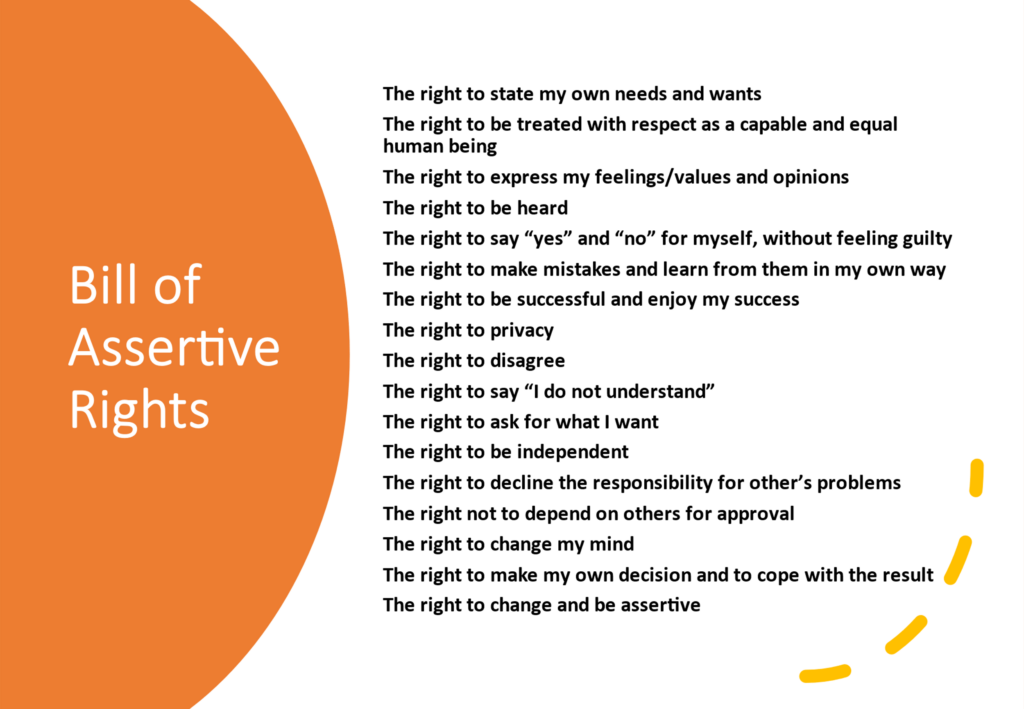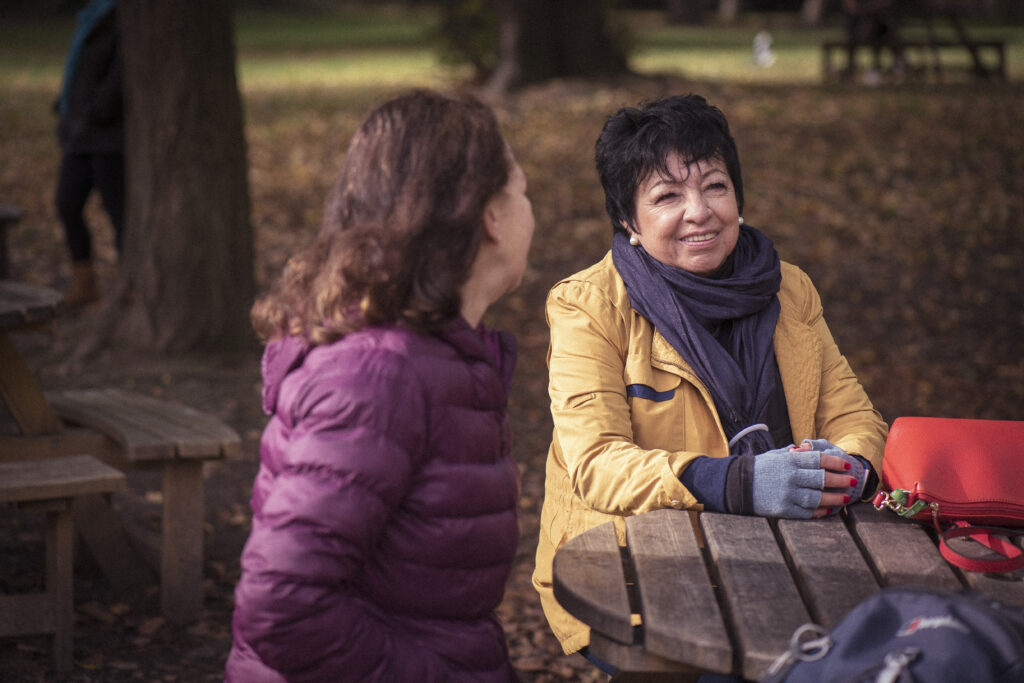Maintaining good wellbeing with a long-term health condition can be challenging. Having a pituitary condition can impact all areas of your life and make it difficult to stay healthy whilst navigating complex things like relationships, conflict and communication.
In this blog post, Dr Sue Jackson (Chartered Psychologist) explores the role of assertiveness in healthy communication and wellbeing, and the ways people with chronic health conditions can sometimes struggle with this. A video of Dr Jackson’s talk on this topic is also available at the bottom of this page.
The art of assertiveness
Lots of people confuse confidence with self-esteem, or assertiveness (I know I did when I was younger). While it is closely related to both of those things, it isn’t the same thing.
Confidence is the extent to which we trust ourselves, particularly our abilities, personal qualities and judgements. It’s about both what we do and how we feel about what we do, particularly the extent to which we are comfortable with the various skills we have. Assertiveness is a social skill that relies heavily on effective communication. To be assertive means learning to honestly express our opinions, feelings, attitudes, and rights, without feeling anxiety and fear, while at the same time acknowledging other people’s rights, thoughts and wishes.
Assertiveness is a communication skill (so it’s related to confidence), but it’s based on how well we understand our needs and boundaries (hence its relation to self-esteem). It’s the art of treating others with the same love and respect that you would like to have extended to yourself. It’s not about forcing your views on other people or being aggressive towards others. It is about taking responsibility for the choices that you make and the consequences that follow from those choices when communicating with others. Assertiveness works best when you’re clear about what outcome you would like to achieve from the conversation/situation you find yourself in.
Assertiveness issues for people with pituitary conditions
I think people with pituitary conditions can struggle being assertive for several reasons. There are a lot of pituitary conditions and they can be complicated to manage and live with. Quite often family, friends and colleagues may not have heard of either the pituitary gland or the various conditions that can be associated with it before and therefore not understand what it means when you try to explain your condition and its management to them. Pituitary patients often say that healthcare professionals don’t provide them with good information to pass onto others, which doesn’t help. Trying to explain something complicated when the condition you have causes fatigue, brain fog, problems with memory and concentration is a tall order. It can be stressful and difficult to ask for help and understanding especially with fluctuating symptoms. You can get pushback – “You managed alright yesterday” – because as a society we’re encouraged to have a work ethic that means you don’t stop for a little thing like being unwell. Other people can think that they know better than you, or they don’t want to believe you because if they did then they’d have to do something about it and right now they may not be able to.

Being assertive
The Bill of Assertive Rights was first suggested by Manuel J Smith in his 1985 book When I say no, I feel guilty. The bill comprises a useful list of the different ways in which we’re all allowed to be assertive. Some of them (for example, the right to privacy) are easier than some others (for example, the right to be heard), which depends on gaining the cooperation of others. There are some (such as the right to be treated with respect as a capable and equal human being) that can easily be infringed by others when we’re not well, making it hard for us to retain our voice, independence and agency. I think some of those problems stem from the fact that, as a society, we don’t have a good understanding of what it means to live with a chronic health condition.
We’re used to people having colds where we expect them to comply with what’s been dubbed ‘the sick role’. The key characteristics of the sick role – having symptoms that others recognise, being exempted from daily activities, seeking professional help where indicated, and wanting to get better – are totally appropriate for short-term bouts of illness. However, with chronic conditions there is no ‘getting better’; we’re in the realms of treatment and not cure and while some exemptions from activities of daily living can be appropriate for some people with pituitary conditions some of the time, it’s not going to be appropriate for all pituitary patients most of the time.
“With chronic conditions there is no ‘getting better’; we’re in the realms of treatment and not sure, and while some exemptions from daily living can be appropriate for some people with pituitary conditions some of the time, it’s not going to be appropriate for all pituitary patients, most of the time.”
Practice makes perfect
Assertiveness is a communication skill that takes practice to get right because it doesn’t always go according to plan the first few times you try it. I’ve seen it taught very poorly on some assertiveness training courses where people are basically being told how to be verbally aggressive towards others. One of the key aspects of assertiveness that often gets overlooked on such courses is that it’s about maintaining functional relationships. For example, you need to take responsibility for how you are feeling and be able to accept and hear that someone else may be feeling differently to you. You need to accept that even having heard you, the other person may not be able to respond to your communication or meet your needs right now.
Communicating effectively with others can be complicated and tiring. You may need to check that the other person understands what you are saying, which means you might need them to repeat back to you what it is they think you are trying to communicate. You can then clarify any bits they seem to be misunderstanding. Remember – we each use words in different ways and we tend to only half-listen to other people. Most of us during conversations are thinking about what we’re going to say in reply to what we’ve just heard rather than properly paying attention to what we’re being told. It can be tempting to up the ante by using exaggerated or colourful language, but that merely serves to stress both you and the individual that you are trying to talk to. We often spend time describing the things that are upsetting us, which is understandable if we want someone to understand where we are coming from, but if we only dwell on what we don’t want it can lead to confusion. The other person might struggle to see how they can help you, so using positive statements identifying what it is that you would like to see as an outcome can be useful. But doing that means you need to have prepared yourself beforehand to understand what a range of good outcomes might look like for you.
Assertiveness and boundaries in a relationship
If assertiveness is about communicating effectively within a relationship then how we see each other as humans plays a part in that communication. If we take a two-person example where two people both see themselves as being OK, then the communication is also likely to be OK. But where one person sees themselves as being OK and the other person as being much less than OK, problems can arise. The person who sees themselves as being OK can become quite critical, while the person who feels that they’re not OK can find themselves becoming defensive and blocked from communicating honestly with the other person. In situations like this, having some boundaries can be helpful.
There is always going to be some people in our lives who, for whatever reason, are struggling to see us as we’d like them to. It might not just be about health or illness issues, it can also be because others see us as performing a particular role in their life (for example, you’re always the helper) and they struggle to see us in any other way (right now, you’re the one that needs help). Having some boundaries in some areas of our life can be very helpful. There is a myth that having boundaries makes you mean and selfish but that’s not the case at all. Creating and understanding where our boundaries are is an important part of self-care. It’s easy to get sucked into spending time and energy doing things for entitled others but when you have a chronic health condition, it’s important to avoid over-giving and over-functioning. Doing more than is required will make you unwell and creates confusion for you and others about what your sensible and safe limits are.
Other ways of being assertive
There are some other things that also help with being assertive. For example, having or fostering an identity as a survivor rather than a victim and believing that there are things that we can do to help us to manage our feelings and to cope. It may not be easy or obvious what those things are though, which means lots of mistakes can be made which we will need to learn to forgive ourselves and others for. It can be a long process full of problems and that can make people feel downhearted. This is where the attitude of gratitude comes in – the ability to be able to recognise and appreciate what I call ‘the little gleams of sunshine’ that still exist and that you can still enjoy. Something as simple as watching a cat wash his ears, or seeing the sunlight sparkling through raindrops, or enjoying the feel of the support of your favourite cushion on the sofa.
Sources of support
Being willing to seek help with something as challenging to live with as a pituitary condition is a sign of strength, not weakness. It’s common to need support to work on your assertiveness, if for no other reason than to get some ideas about things you can try to help explain your condition to others. Although you might also want to discuss how to deal with tricky people in your life and whether and how to set some boundaries to help you with your self-care. So it might help to remember that The Pituitary Foundation has both telephone buddies and a helpline you can call, and they now have a new counselling service run by Rareminds.












